Introduction
The global economy has been striving for a sustainable growth following the global financial crisis and its recessionary impact; however, the advanced economy like Europe stay behind fragile still 2012 with a global growth of 4% although the emerging Asia nations evidenced better recovery rate up to 7¼% while the UK economy gained 4¾% (BIS 2010, p.8).
Under such economic downturn, the government of UK has aimed to establish foundation for new style of growth in the UK introducing aggressive and productive economy through training and skills development that would ultimately improve the living standards, climate change and efficient public service delivery and gear up the recovery rate.
This paper has aimed to assess how the knowledge development and boost of intellectual skills and training for organisational development could assist to overcome the impact of current economic downturn in the national and international levels providing right direction for sustainable growth that would ultimately assist the policymakers for further research.
The Theoretical Framework for Training and Skills Development
Keating (2007) pointed out that the changing dynamics of employment patterns have generated the emergence for wider investigation with the theoretical framework for training and skills development in order to establish sustainable national skills strategy aimed to keep effective contribution to productivity and would capable to meet the international skill market demand.
There are diverse methods of skills development practice in different countries with increasing complexities the skills development systems particularly address the local market needs while academia structure their learning direction with compliance to the national direction for responsible skills ambitions.
This part of the paper would discuss some theoretical framework essential to analyse the UK skills development and employment strategy aimed to establish an excellent human resource motivating the engagement of employer and employee aligned with skills for the future.
Interventionist Views of Skill Development
PRO-ED Inc (2010) mentioned that the interventionist views of skill development argued to focus on the activity-based where every intervention session would generate learning familiarities for both the interventionist along with the person who receiving that service, for instance the children and his guide working together has many things to learn vice versa.
Activity based learning involved to many complex things derived from the environment throughout intervention that is pleasant, tranquil, along with mutually supportive by the learner and teacher productive sessions, where the production process is very interesting for practical learning from operation, in the playground a child could learn how to play cricket that may difficult to taught at reading room.
From the viewpoint of interventionists, the transformation of knowledge through activity-based scheme contributes to learning strict rules and regulation during intervention sessions that can develop capabilities to conquer the disturbing situation without troubling the others.
Durrant (2012) pointed out that the Labour government during 1997 introduced the paradox in skills policy for the UK with delicately shifted direction aligned with voluntarism of skills demand, with framework of skills supply influenced by the interventionist role for the government directed to the private and public sector employees development with skills ambitions aimed to reach at the target.
Strategic Plan of UK for Employment and Skills Development
UKCES (2009) pointed that the government of UK has set up its strategy for skills development with major two goals that is to generate sustainable economic growth and to deliver enough opportunity of employment for all working force of the country, the government also determined to shift the UK in to global leading position for employment and skills.
The ‘UK Commission for Employment and Skills’ (UKCES) is the governmental agency formed with the leaders of private and public sector and dedicated to implementing the such highly ambitious goals and empowered to provide necessary suggestion and direction to the top level the government to generate skills at all level of the country within 2010.
Following the global financial crisis in 2008, the UKCES was organised and setup its board responsibilities to assess annually the progress in the employment and skills development, advice to create employment opportunity, improve skills, innovation, and productivity homogeneously all over the country to generate quick progress by encountering with the economic downturn.
At the same time, the UKCES also responsible to formulate policy for skill development, implication of those policies, identify the challenges of implication and look after the delivery of innovation with wider engagement of the employees through adequate investment for the programme of workforce skill development.
UK Policies and Practice for Skills Development
UKCES (2010) pointed to its vision to establish the nation pedestal on with excellent skills aligned with sustainable economic growth and employment opportunities for all and setup its gaol to reach at world class skill levels and place UK at the top eighth of the OECD nations by 2020, it indicates that the country has to generate 20 million employment opportunity.
During the last decade, millions of apprentices have achieved basic and intermediate skills, but there are significant numbers of unemployed among them, on the contrary, to meet the increasing needs of skills the UK employers are spending £20 billion per annum for training and skills development; thus, it is really a great challenge for the government to attain vision 2020.
To encounter with the challenges the government has set out following three strategic priorities –
Strategic Priority-1: Strategic Demand Oriented Employment and Skills System
The top priority of employment and skills scheme is to generate sustainable economic growth through an efficient system that enables quick response to the market demand oriented supply of human resource with provocative skills competent for the future while the academia would assist the individuals to maximise their talents;
Strategic Priority-2: Maximum Prospect of individual Skills and Sustainable Job Opportunity
The UK would attain excellence of global standard workforce by 2020 and to do so, the next priority of the government would focus on individual ambitions providing maximum opportunity for all individuals to engage their talents in the right direction with appropriate training and skills development programme that would ultimately bring professional success and prosperity of the individual;
Strategic Priority-3: Boost of Employer Ambition for Additional Investment for Skills Development
At the preset stage, the non-wage expenditure of UK employers for staff training and skills development is £20 billion while the government is spending £12 billion adult learning and skills, in context of other competitors, the UK’s investment for skills development is very poor and emergence to raise this investment by motivating the willingness of employers in this regard.
Strategic Approach of the UK Government for Skills Development
The strategic approach of the UK government for Skills and employment development has integrated with a five-step mode to attaining the long-term vision, the first step of the model provide analysis of the impact of skills development from individual engagement to the economic competitiveness along with social cohesion that generally assist to formulate policy and direction for practice.

At the second step the challenges are identified for increasing investment for skills development, at the third step the effective policies and incentives are organised and put for practice in the next step, the last step built performance based culture to assess the improvement.
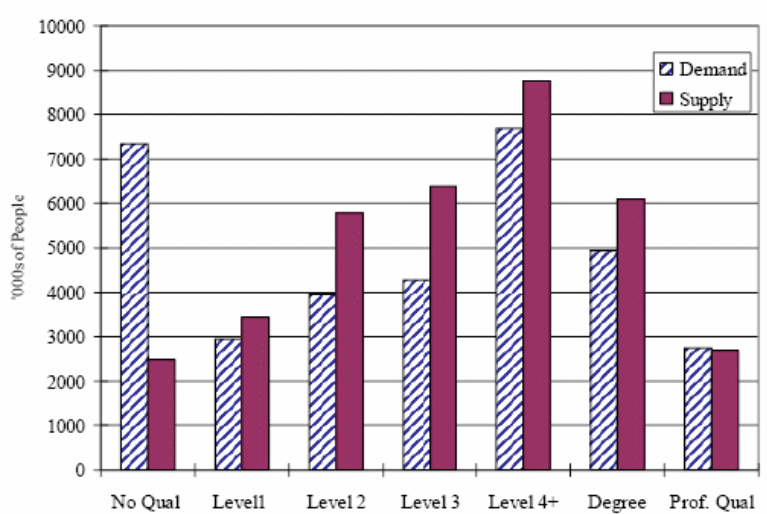
The UK Government’s Strategies on Vocational Training
UKCES (2011) noted that UK is comparatively low ranking among OECD nations in terms of the time used in vocational-training; moreover, the percentage of workers at job getting some form of regular vocational-training is rather low in benchmarks of EU; however, still it possesses the principal percentage of projects in comparison to other European countries concerned with vocational-training of workers.
The following graph shows the percentage of workers getting some form of vocational training in the country; it is notable that in case of the UK, the percentage of workers is less than 35 percent, where as countries such as Czech Republic, Slovenia, Luxembourg, Finland, Belgium, France, and Sweden have a much better performance in terms of vocational training –
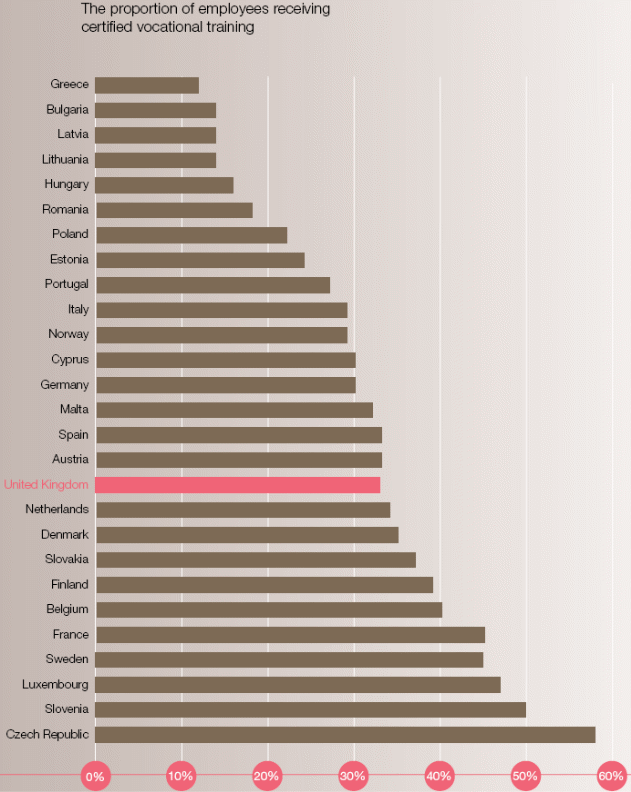
While such training performance is substantial in comparison with Asian-standards, the degree to which it would meet prerequisite of vocational-courses is doubted; UKCES (2009) noted that less than eighteen percent of the workers got a vocational-training that led towards a nationwide-acknowledged-qualification; to be specific, out of fourteen million workers receiving a vocational training, two and a half million got nationally-recognised-qualification.
Because of this, the government of the United Kingdom undertook several strategies even within recession to mitigate the rising concerns relating to its training programs; for example, the UK Vocational Qualification Reform Programme (VQRP) has been designed to assist to address this apprehension; this programme is looking forward to improve the vocational training qualifications, making the entire scheme more receptive.
It is anticipated that together with additionally supple methods of teaching appraisal, the Vocational Qualification Reform Programme would also permit apprentices to attain credentials in strong steps; in addition, it is notable that a remarkable aspect of this reorganization of the vocational courses is to generate an arrangement, which would meet the demands of employers for lesser entities of knowledge.
One of the significant parts of the rearrangement is that the vocational training will be carried out within a system that provides development to a superiority guaranteed certificate; the government and other associated bodies have noted that if these reforms remain to be a success, then an rising percentage of employers training their workers would focus on credentials acknowledged countrywide.
However, AOC (2012) identified that there are no grounds to suppose that the United Kingdom’s Vocational Education and Training performs badly in contrast to Australia, Canada or Germany – rather, this provides suppleness, strong eminence assertion procedures, efficient governmental assurances of superior benchmarks of professional significance, reliability, dependable and good-governance, administration, and coaching, as well as better clarity aspirations.
Recession and job related training to develop skills
Mason & Bishop (2010, p.36) stated that the employers of this country have changed their policies to reduce costs related with the implementation of skills development plan and training process during the recessionary period; moreover, different employers have considered different forms of training programs, such as, the employers of 1990s focused more on the shorter-duration skilled development program.
However, CIPD (2012) provided survey report and mentioned that sales revenues and other business transactions declined significantly in the fiscal year 2008; therefore, a large part of the employers decreased their budget for training to reduce overall expenditure to sustain in the market, for instance, the following figure gives more details in this regard –
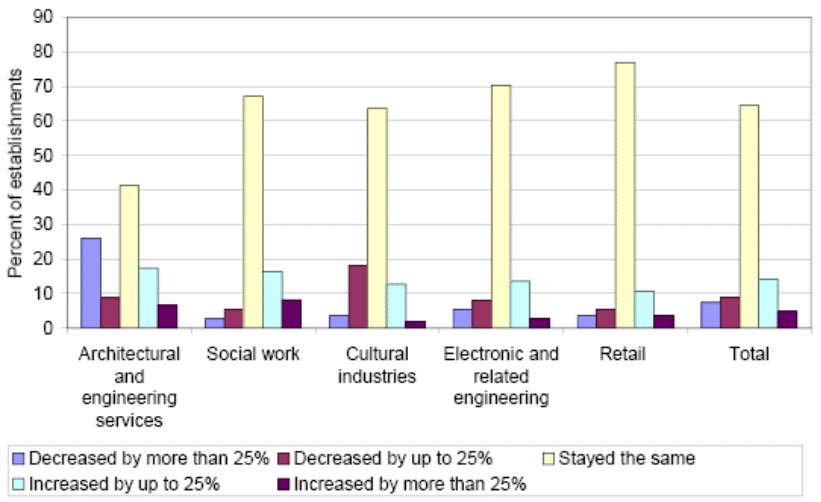
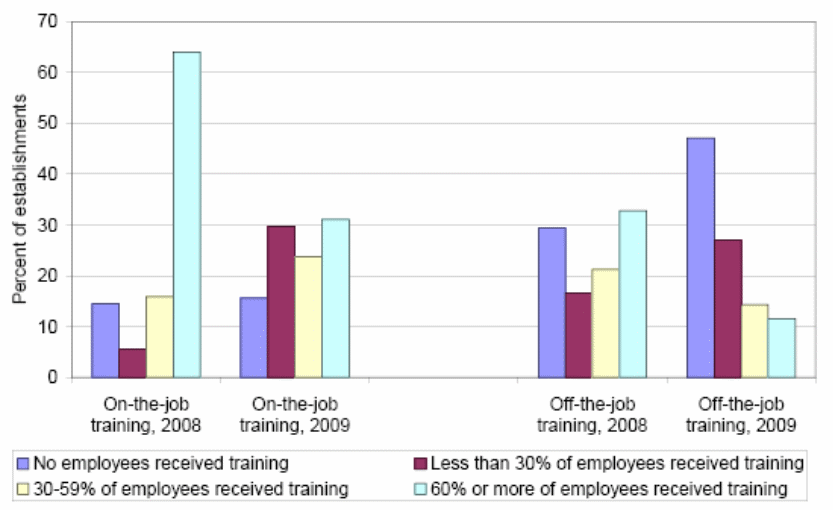
On the other hand, UKCES (2009) reported that UK experienced growth in the job market in spite of adverse economic condition and reduction of employment rate in 2008.
In addition, UKCES (2009, p.3) argued that the government have already taken many initiatives (Ambition 2020) in order recover the economy from recession and change the environment because the employers needed expert, high skill, and more competitive employees to evidence a radical change in terms of higher performance at lower cost.
At the same time, UKCES (2009, p.6) identified that development of high skill labour force is one of the most difficult tasks for the employers because employers had cut the job of the skill employees and these employees may get job in other place where they can receive no training related with their job responsibilities.
Moreover, the employers had reluctant to increase budget for the training purpose, which can be a significant cause to increase unskilled labour force at present; however, the next figure shows data for the employees under 16-64 age group –
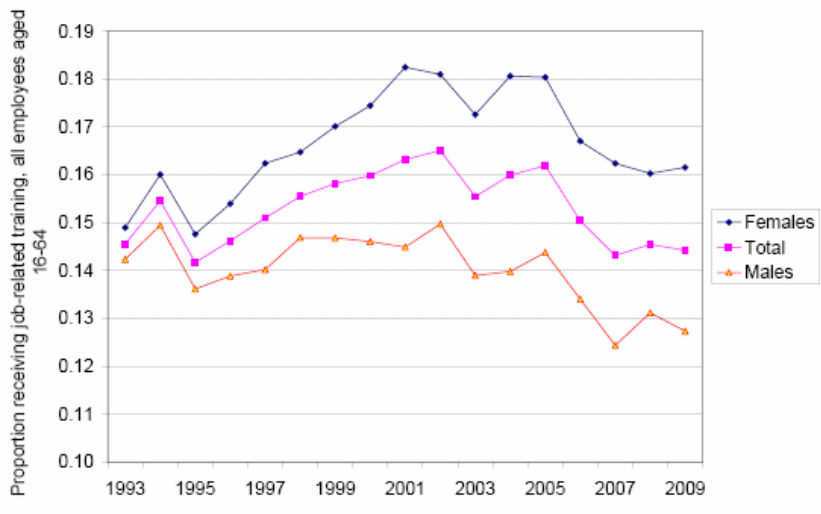
The above figure represents that Job-related training for all employees decreased dramatically from 2007 and increased low skill labour force in the UK. However, some positive and negative factors are –
- Bewick (2009, p.26) stated that the UK faced “collective amnesia” due to shortage of skill employees, but global financial crisis mask masked these systemic weaknesses;
- However, the government of the UK amended statutory provisions and introduced Employment Law 2013 to develop this sector, for instance, all people between 16 and 17 years old in the UK must have to continue in education or training;
- The employment rate in the private sectors increased significantly in 2012 and this rate decreased in public sectors, which was the reflection of education and reclassification of training system;
- Introduction of new traineeships programme under new law to support young people and this programme includes work skills training, development of English and math proficiency level (DBIS 2013);
Comparison of the UK with Germany and Netherlands
According to Keating (2007), UK has developed a mixed-model in its work-training, skills, and VET scheme and in its method of encountering present and future-skills; the fundamental arrangements of edification and training fluctuate throughout the four amalgamated realms – Scotland is greatly independent in edification (but less in training), and institutions in Northern Ireland and Wales are inclusive with vocational-elements.
Moreover, in England, secondary edification is varied in both conditions and curriculum; numerous apprentices are enthusiastic towards further education, whilst unsettled worry amid scholastic and professional credentials has resulted in an innovative set of vocational-programs; however, liability of VET segment had detached from local government in 1990s, and this segment has been exposed to various modernization from several governmental branches.
Moreover, the country theoretically took an open-minded or deliberate approach for developing the skills and training of the apprentices; it applied several procedures to inspire employer and apprentice’s demand for training, including the People programme, Training Credits (coupons) and an income funding; fundamentally, this matter of constructing demand for training is the major confront of the deliberate and mixed model,
Germany, in comparison, has endured numerous major tremors over the last couple of decades – firstly, reunification has adjoined encumber of scientific and commercial backwardness, secondly, a lengthier procedure of partial-obsolescence of the training-system has generated chiefly middle-level-skills in context of increasing significance of high-skills-level, and thirdly, there has been extremely deprived performance and huge disparities in performance of German apprentices.
This has led to substantial stress on VET-segment and Dual-Scheme of apprenticeship that offers the targets for about sixty percent of school-leavers; theoretically, the German scheme is demand-oriented, since it is mainly based on apprenticeship spaces that are offered principally by private segment corporations; nevertheless, it is an obverse end arrangement that provides a huge number of apprenticeship skilled employees.
Keating (2007) also noted that the German scheme is highly controlled with a composite procedure that comprises the local governments and social-partners; it provides an approach where partakers are firmly incorporated within the course of shaping the necessity for and deliverance of credentials and training; UKCES (2012) noted that this intended-model incorporates governmental collaborators, and ties institutional-structures of VET:
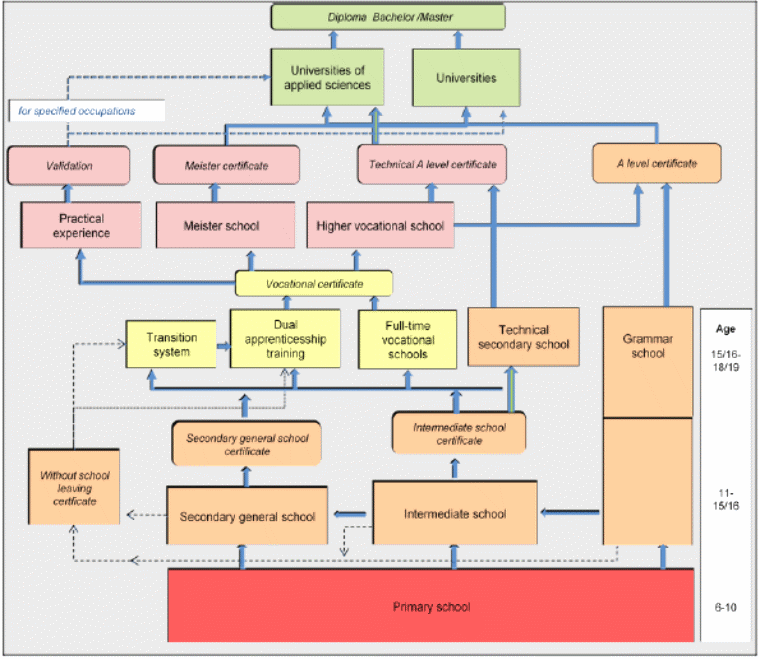
In contrast, like Germany, Netherlands possesses curriculum-oriented vocational-training-system, but with superior of suppleness; it offers an occupation-oriented structure that recommends the substance and duration of training-courses:
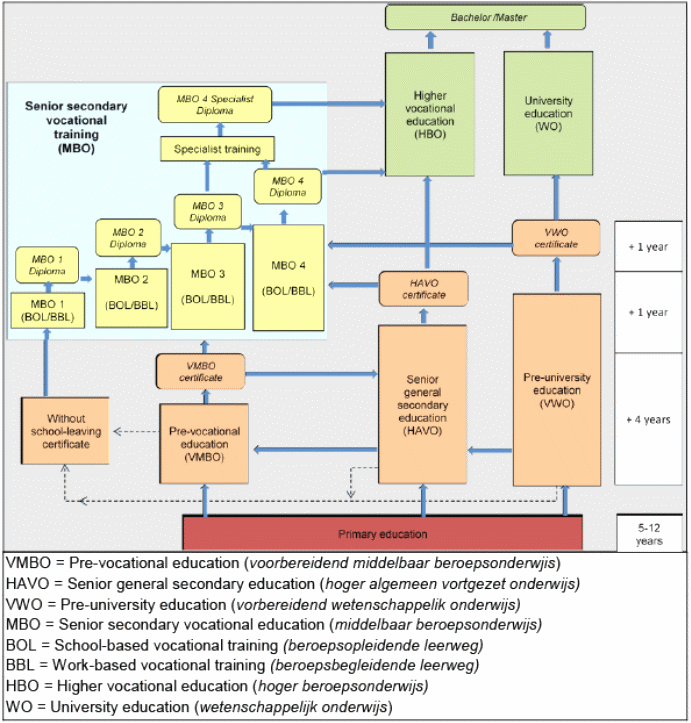
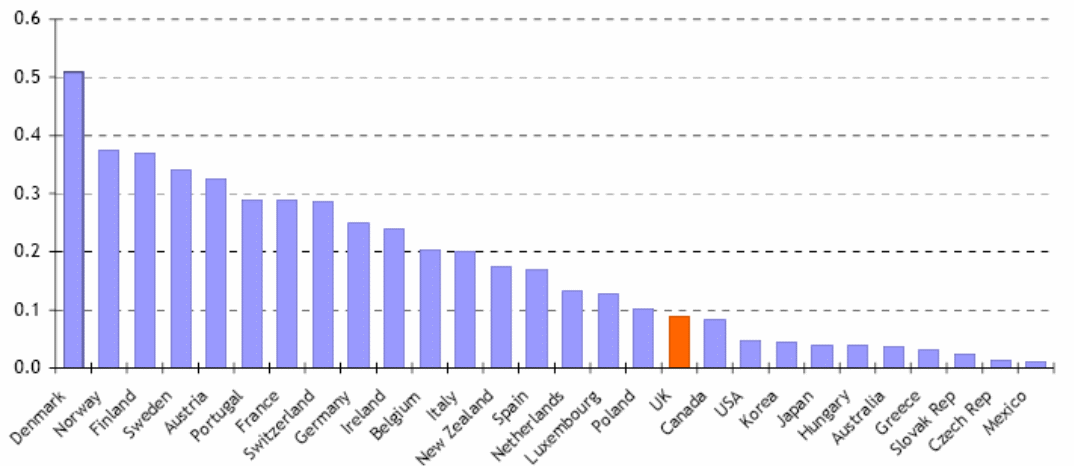
Recommendation
- The government should develop powerful monitoring committee to continue different training and skill programmes and assess the success of these programmes;
- To make the UK a global leader in skills, DfES (2006) recommended that that 95% adults have to take basic literacy knowledge, shifting the balance of intermediate skills from Level two to three, individuals have to raise their aspirations and awareness;
- The government should simplify the entire system including demand-led system in order to attract the employees of different cultural background to develop skills for the different sectors;
- The legal framework has not imposed any liability or obligation on the employers to train their employees;
- At the same time, the employers in the present recessionary period have provided less importance on training and decreased budget for training as part of their cost reduction programme. Therefore, the policy makers should arrange awareness programme in order to give the message to the employers that skill labour force can increase productivity along with sales revenue by showing their performance in the workplace;
- There are many other factors to improve skills, such as, closer supervision of the labour supply, tackling inequality and consider enhanced ‘skills utilisation’, targeted support for displaced employees, strengthening the voice of employers, increase budget in the right sorts of training and arrange high-value-added training programme, and so on
Reference List
AOC 2012, UK Vocational Education and Training (VET) Towards a Comprehensive Strategy for International Development. Web.
Bewick, T. 2009, UK employment and skills in a global recession. Web.
BIS 2010, A Strategy For Sustainable Growth. Web.
CIPD 2012, Learning and Talent Development: Annual Survey Report. Web.
DBIS 2013, Employment law 2013: progress on reform. Web.
DfES 2006, Prosperity for all in the global economy – world class skills: The Leitch review of skills and World class skills: Implementing the Leitch Review of Skills in England. Web.
Durrant, H., 2012, Governing Skills, Governing Workplaces: State-steered Voluntarism in England under New Labour. Web.
Felstead, A., Gallie, D., Green, F. & Zhou, Y. 2007, Skills at Work, 1986 to 2006. Web.
Keating, J. 2007, Matching supply of and demand for skills: International perspectives.
Mason, G. & Bishop, K. 2010, Adult Training, Skills Updating and Recession in the UK: The Implications for Competitiveness and Social Inclusion. Web.
Meager, N., 2008, The Role of Training and Skills Development in Active Labour Market Policies. Web.
UKCES 2009, Ambition 2020: World Class Skills and Jobs for the UK. Web.
UKCES 2010, Skills for Jobs: Today and Tomorrow. Web.
UKCES 2011, UK Employer Skills Survey 2011: First Findings. Web.
UKCES 2012, International approaches to the development of intermediate level skills and apprenticeships. Web.